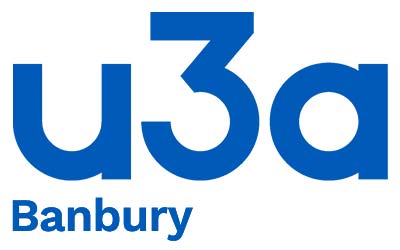What are Interest Groups?

Our interest groups
All u3as have interest groups that have evolved over time as members work together in a common field. There is no fixed format or procedures for a group or its convenor to follow. The Third Age Trust has produced More Time To Learn, an excellent booklet full of ideas for group learning. It can be obtained from the members’ area of their website in printed form or by download.
Most groups cater for the non-specialists in the subject and having a mixed group in terms of skills and experience is often a bonus. In Banbury, many groups meet in members’ homes, others in local venues such as Amos Court and Stanbridge House or outdoors. The activities are for the enjoyment and benefit of its members, so everyone in the group should be responsible for planning the content. Public liability insurance is covered but responsibility for personal safety must rest with the individual member.
Some groups, especially those that use rented venues, have to charge a small fee for attendance. Most groups do not have other costs. It is at the discretion of the group whether to have refreshments and how they are paid for. A Banbury u3a member can join as many groups as they wish, providing there is room for them. In order to join a group, contact needs to be made via the email address on the website or in the table printed on the sheet of contact details. If you don’t receive a response, contact our groups secretary on
Some groups, often those held in members’ houses, may be deemed full. In this situation, prospective members should be placed on a reserves list so that when a group member is unable to attend, they are given the chance to take their place on that occasion. Each group may have its own methods of informing group leaders of their intention to attend but as a general rule; members should inform the group leader if they are going to be absent from a group meeting.
How groups are organised
Most groups have a group convenor whose role is not that of a teacher or authority figure and whose responsibilities can vary greatly between groups. Some groups may have joint convenors or appear almost leaderless. Some groups, for example, need to plan months ahead while others will need no forward planning at all.
There are usually 2 kinds of tasks with running a group:
- The administrative tasks which could involve booking a venue, taking a register, doing paperwork or refreshments.
- The organising of tasks which involve some responsibility for the content of the studies. Knowledge and experience of the field of study is not always necessary. This is especially true with the common practice of shared delivery, where many members of the group take it in turns to provide a presentation, demonstration, discussion seminar or other activity.
Therefore, there is complete flexibility in how a group is run with tasks separated or combined and in who takes on the responsibilities required. One person has to be willing, however, to be the contact person for the committee and for the general membership. The role of group convenor is therefore rarely onerous.
Expectations of group members
Interest groups are the lifeblood of a U3A and membership implies time and effort on behalf of its members. U3A members are generally busy people with many other commitments to fit in and the casual attendee can create problems for the organisation of a group’s activities. Group members should:
- Remain courteous, respectful, non-critical and non-competitive at all times.
- Respect the values and perceptions of other group members.
- Follow the agreed procedures and practices of the group.
- Inform the group convenor when they will not be attending. (They are under no obligation to give reasons).
- Be involved sometimes in the preparation of sessions, not just attend them. It is not expected that all members of a group contribute equally due to their different levels of knowledge and skills, but members are expected to play their part in the activities provided, rather than leaving all of the work to others.
- Tell the group convenor when they no longer wish to belong to the group. Any member not notifying the group convenor that they are going to be absent on 3 occasions will be removed from the group’s membership list.
